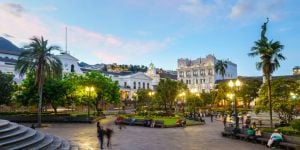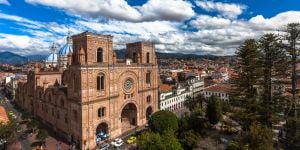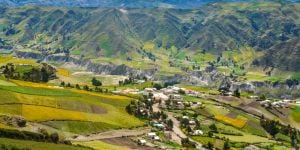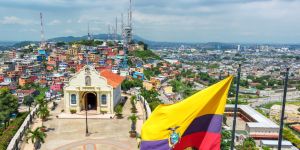How has Ecuador been improving?
As an expat, one of the things that I look for when living in a country is the direction that it’s going. Simply put, is it becoming better or worse. Living in Ecuador, I can say that things for the most part have been improving and below is a list of some of those things. From time to time, I will update the list, and hope other expats contribute as well.
Internet
There has been tremendous improvement in quality. Multi-player gaming is a good way to gauge the quality and IMO it has improved a lot. There are other variables that are in play but nevertheless using the same gaming console and the same games, I have seen improvements. It’s however important to understand that some games lag in terms of playability because of latency.
So, some games like Madden Football, there will be lag if playing from Ecuador because the player pool is mostly in North America. I don’t want to get technical but this is important to understand. IMO, it’s better to play games that are widely popular internationally as they’ll be more servers and players closer to you.
If you play any of these popular games, like The Division, you’ll notice sometimes the players you’re playing with are speaking Spanish. My general observation is that there is less lag, less jitter, and just more stability.
In terms of ordinary applications like Netflix, video calling, and general internet use, well it’s always been good, provided you have the minimum speed requirement for those applications.
Beer
For a small country, Ecuador has it going on with their beer. Club, which is a lager, is comparable to many European beers including Becks and Heineken. For those who like beer with hardly any taste there’s Pilsener which is similar to many American beers like Budweiser.
But what’s most impressive, and I bet most people didn’t know this, there are more than 80, that’s right Eighty different craft beers that are locally brewed. Some of these craft beers which they call cerveza artesanal are region specific. What I’m personally waiting for is a good stout to be locally brewed, when that’s done, I ask for nothing more. I mean if the Jamaicans can do it with their Dragon Stout then surely Ecuador can too.
Food:
I think that one of greatest advantages of Ecuador's improvement is the chocolate. I have found one of the best places to buy it both in a large bar format as well as small individual pieces that sport wonderful interesting flavors and tastes. Great place for Xmas gifts and stocking stuffers. A french chef and a local actually cried when she ate the samples...that says something. Here is the link and well worth a visit: https://foursquare.com/v/godika-chocola … ab503dbc0. Cindy
Dear Cindy,
The link you provided is not working from my laptop.
Please provide the name, city and location of this exceptional chocolate and gift shop in a post.
cccmedia
Here is the link on Foursquare to Godika chocolatier in Cuenca:
https://foursquare.com/v/godika-chocola … dab503dbc0
And another chocolate and dessert place for golosinas with several branches in Cuenca:
https://dikaty.com/
Alright, so Internet, beer, and chocolate have all been improving.
What else?
Car prices are going down, down, down 
There are two main reasons, a decrease or elimination in some taxes, and also car dealers are offering better prices.
To demonstrate how much prices have decreased: An https://www.expat.com member in the summer of 2017 bought a KIA Sportage Active for $29,990. The current price of the same model is $24,990. BTW, it's the same car, an automatic with K-tronic transmission.
That's almost a 20% difference and prices, according to auto executives, will continue to drop over ensuing years.
For greater understanding, prices remain much higher than other countries, but in terms of what is transpiring locally, this is definitely an improvement.
Not to rain on the parade but the noise level seems to be getting worse and later into the night and much more frequent. At the rate it seems to be going I expect one day there will be no breaks in the celebrations.
JadeRiver wrote:Not to rain on the parade but the noise level seems to be getting worse and later into the night and much more frequent. At the rate it seems to be going I expect one day there will be no breaks in the celebrations.
Expats moving to Ecuador need to be choosy about their selection of residence.
A gated condo or conjunto in a decent neighborhood with a condo board will keep noise under control -- more than likely -- compared to some disjointed vecindario in Nalgas del Cerdo, Sucumbíos .. where noisy roosters, barking dogs, late-night boozers and squawky saxophonists are completely unregulated.
cccmedia
JadeRiver wrote:Not to rain on the parade but the noise level seems to be getting worse and later into the night and much more frequent. At the rate it seems to be going I expect one day there will be no breaks in the celebrations.
You're not raining on any parade. Ecuador has positives and negatives. Perhaps a separate thread with the negatives should be started, but here is fine too. 
I’m a rationalist, and so I try to make sense of things. I don’t like the excessive noise either and these past 10 days or so with Quito’s fiesta are the loudest. I mean this past Friday at noon, a chiva bus (discotheque bus), stopped by my neighbor’s house to pick up a couple of middle age people. It was noon, and they were blasting music.
For people who don’t know about these chiva buses. Well, people dance on them with big loud speakers pointing inward towards the dancing people and some speakers directed outward towards the street.
Anyhow, that same day, while walking around Carolina there was a chiva bus stop to pick up people, and kids were boarding too. So, this is who they are, as they are exposed to this kind of noise at a young age.
People seeking peace and quiet, Quito is definitely not a good destination. I didn’t even mention the live bands playing music before noon, or the loud sound of fireworks that explode at all hours.
Is Ecuador becoming better or worse? To some that means ... this thing ... or that has improved. I am going to offer a different perspective. When I first moved to Ecuador (no longer live there), it was with eyes wide open. I had done business in country for over 20 years at the time and the city I relocated to was very familiar to me. I knew what I was getting into. It was the very start of the Correa Administration.
My time in country doing business, led to a newly appointed Correa diplomat, with whom I had a previous business relationship, offer me his condo to sell on his behalf. When I went to visit him for the first time upon my arrival, I remember his surprise at my actually moving to Ecuador. He laughed and said, "I still can't believe you're here!" My response was to express my joy at the decision and to go on, non-stop as I am prone to do, for about 5 minutes as to why I had thought Ecuador may have finally turned the corner of progress. I will forever recall his very Gringo-like response:
"My friend I respect your encourage and your admiration for our country. But I am afraid I must disagree with you. I may support President Correa and even go off on a diplomatic assignment to represent my country, but I recognize only one quintessential truth about Ecuador: "The more things change, the more they stay the same."
When he and I, once again, occupy the same country, I owe him a dinner for losing the bet. Fundamentally, Ecuador must learn to be "user friendly", unobtrusive and efficient. It's the same old Ecuador ... one step forward ... two steps back.
Improvements in my short time visiting and living in Guayaquil:
* The rapid adoption of 21st-century applications like Airbnb, Cabify, Uber, Glovo (considering how lots of rural Ecuador lives with pre-industrial technology)
In spring 2017, I tried to open my Uber app and there was no service here. As I kept up with reading El Universo daily, I saw that Uber launched a few months later, despite the taxi unions protests. I started using it again in 2018. Even though it may be only semi-legal, I still feel more comfortable in an Uber than a Guayaquil taxi, where none of the drivers ever use a meter (at least in Cuenca, the drivers use meters).
Airbnb is another love. I would have overpaid for hotels/hostels on my past trips here by more than double if Ecuadorians had not adopted this easy home rental innovation.
* Revitalization of my neighborhood.
I had been given the impression by my girlfriend that nothing changes or improves much in her neighborhood, and that it's slowly going downhill.
But by my observations, I have seen lots of progress. I've seen a half dozen new tiendas, with bright lights, refrigerators, fresh paint, and new floors take the place of old, rundown tiendas with a single 40-watt bulb that hadn't been cleaned since 1983. A cool new bar and a great ice cream shop have opened up in the neighborhood too. It's hot, Guayaquil needs ice cream!
At least 3 homes within a block are properly permitted (shocker! doing construction by the books!) and being gutted and actively remodeled.
To me, this is an example of human progress, however small, in Guayaquil
lebowski888 wrote:Improvements in my short time visiting and living in Guayaquil:
At least 3 homes within a block are properly permitted (shocker! doing construction by the books!) and being gutted and actively remodeled.
To me, this is an example of human progress, however small, in Guayaquil
Hey, Lebowski ... I assure you that if you have 3 homes in your vicinity properly permitted in Guayaquil, that is not just progress ... it is an actual recorded miracle in the making.
Hector,
I appreciate your contributing to this thread about Ecuador's direction, given your experience and writing skills.
Please tell us in more detail how you reached your conclusion that Ecuador has not been advancing.
Tell us, if you would, what cities in particular you are thinking of?
What about the supposed 60 percent reduction in air pollution in the cities due to higher-quality gasoline?
What is your evaluation of improvements in building codes and construction in cities such as Bahía since the 2016-17 earthquake damage and condo wall-cracks issue discovery?
What about the Quito metrorail under construction and the opening of the new transit system in Cuenca?
How do you compare safety between Ecuadorian cities and Colombian cities? As you probably are aware, 21 died at a police academy in metro Bogotá, Colombia, in a car-bomb attack this week attributed to a terrorist group.
cccmedia in Quito
I lived in Ecuador 1959-1961 and there were many people walking around literally in dirty rags and living in mud brick huts. Believe me, Ecuador, Colombia and other South American countries have improved and advanced A LOT compared to what they used to be. Although there are still many many poor people, even the poverty has improved to where some of the poor have smartphones and the internet.
OsageArcher wrote:I lived in Ecuador 1959-1961 and there were many people walking around literally in dirty rags and living in mud brick huts. Believe me, Ecuador, Colombia and other South American countries have improved and advanced A LOT compared to what they used to be. Although there are still many many poor people, even the poverty has improved to where some of the poor have smartphones and the internet.
That’s a good point OsageArcher. There are papers that document the increase of the middle class in Ecuador. It basically doubled from 2005-2015 to a 37%.
Ok, but quick replies to each topic separatly, ccmedia. I will start, by basically pointing out that I am not making a historical context argument, for or against, the Ecuadorian economy. Though that might be a lively debate, given accurate comments by vimsimple and OsageArcher. However, despite the accuracy, one might argue that Ecuadorians, on average, might have lived relatively better during, for example, the Eloy Alfaro era. Anyways, I am talking about things through the prism of a First World (Ugh! Hate the term) looking to become an Ecuadorian Expat and how they would relate to today's realities.
cccmedia wrote:Hector,
I appreciate your contributing to this thread about Ecuador's direction, given your experience and writing skills.
Please tell us in more detail how you reached your conclusion that Ecuador has not been advancing.
Tell us, if you would, what cities in particular you are thinking of?
cccmedia in Quito
For the purposes of the broader points I am making, which mostly embody sentiment, culturally consistent traits and government bureaucracy, I would say my reference is to literally all cities in Ecuador, especially on a comparative model basis to other nations. Quito is the most cosmopolitan and rapidly advancing city and, even there, the progress is measured more by the speed of a snail than a cheetah. Be mindful ... Ecuadorians have perfected the art of "perceived change", where the differences run a mile wide, but only an inch deep. So ... I am speaking of Ecuador as a whole, inclusive of all its cities.
cccmedia wrote:Hector,
I appreciate your contributing to this thread about Ecuador's direction, given your experience and writing skills.
What about the supposed 60 percent reduction in air pollution in the cities due to higher-quality gasoline?
First ... slow train coming, given similar advances, already much more mature, in other global comparable countries. Secondly, I would argue that some of that change is real, but maybe not as advanced as some might think. In the more major cities, I can still smell the exhaust fumes from the buses. The changes required get made, but when parts falter, repairs are delayed. Part of a culture of procrastination. And ... no ... mañana does not have the same meaning in all Latin countries. Sure it can mean next week or next month, but seldom outside of Ecuador do you find its meaning redefined as "never".
Also, the Correa Administration made pollution control a priority, as part of the sustained tourism promotion campaign. How true is this priority today? How true will it be tomorrow, especially if the Ecuadorian business community eventually gets its preferred "industry-friendly candidate"?
Glad to see the progress, but will it carry? Will it sustain? Even if it does, Ecuador trails other relatively comparable nations.
cccmedia in Quito
cccmedia wrote:Hector,
I appreciate your contributing to this thread about Ecuador's direction, given your experience and writing skills.
What is your evaluation of improvements in building codes and construction in cities such as Bahía since the 2016-17 earthquake damage and condo wall-cracks issue discovery?
The temptation, here is to mount the nearest soapbox and embark on a quasi War and Peace speech. Look, there are properties throughout Ecuador that I will not sell, which my colleagues do sell. I am talking high-rises that were built under dubious circumstances, some before the stricter earthquake resistant codes were passed ... some after. This is especially dangerous along the coast, where porous cement is often used in construction. However, fwiw, I have seen Serrano developers mock coastal construction, then instruct their construction foreman to buy the cheaper porous cement and ship it inland from the coast.
So, do I like the new codes? Sure ... don't they sound lovely. Now ... tell me ... who is enforcing that code? Stand at a construction site for a month. Tell me how many inspections do you see being conducted? Truth is that the Ecuadorian authorities, by and large, lack the manpower to enforce the very codes they pass. Developers/Builders know this ... and don't fear it. In fact, if they get caught ... their go to position is to whip out the little, brown envelope. So ... code gets a B+/A-, the enforcement gets a straight up F grade from me.
cccmedia in Quito
cccmedia wrote:Hector,
I appreciate your contributing to this thread about Ecuador's direction, given your experience and writing skills.
What about the Quito metrorail under construction and the opening of the new transit system in Cuenca?
What about the Quito metrorail? What about the Hindenburg? The Titanic?- The last I checked -- sure it is much worse now -- the project was already at double budget cost for completion and wasn't even 25% done. Then there is the issue as to whether, outside the beautiful concept on paper, it will even alleviate the horrid Quito traffic. Why? Some have said the route and stops will not do enough to alleviate the congestion where it is most needed, with alleged rumors that concessions were made to avoid more desirable routes to spare the money elite the inconvenience of the disruption. Regardless of where the truth begins or ends, this rivals a project in Thailand, from the past, as one of the biggest public infrastructure boondoggles, on a relative scale basis. The cost overruns are obscene.
cccmedia in Quito
cccmedia wrote:Hector,
I appreciate your contributing to this thread about Ecuador's direction, given your experience and writing skills.
How do you compare safety between Ecuadorian cities and Colombian cities? As you probably are aware, 21 died at a police academy in metro Bogotá, Colombia, in a car-bomb attack this week attributed to a terrorist group.
Hardest question for me. Hard for me to take personal bias out this equation. Always been that way. I have been all over this globe, in horrid crime hot spots and never been victimized. I have a very distorted perspective of risk. I do stupid things I would never advise others to ever do. So ... that's my personal bias.
I don't feel more safe or less in Ecuador than in Colombia. I will say that, on balance, no major city in Colombia, not even Bogotá, gives me a threat perception like Guayaquil. But even in Guayaquil, I feel relatively safe.
Here is how citizens in each country have responded to surveys, on a comparative basis (different from official crime stats). See link below:
https://www.numbeo.com/crime/compare_co … y2=Ecuador
Here is a link to actual crime stats, converted into a crime index score. Not much separates Colombia from Ecuador. See link below:
https://www.numbeo.com/crime/rankings_b … region=005
Lastly, it is true that Colombia has a history of rebel movements. Ecuador does not. However, Ecuador has a history of military coups, Colombia does not. Ehhh, all balances out in the end. For me, crime is not a differentiating factor in the Ecuador vs. Colombia dynamic.
cccmedia in Quito
For the record, readers should note that my tagline "cccmedia in Quito" was inadvertently put at the end of the last three or four of Hector's posts .. and the main body of the posts are Hector's comments, not mine.
Thank you for responding to my questions, Hector. 
cccmedia
Lastly, it is true that Colombia has a history of rebel movements. Ecuador does not. However, Ecuador has a history of military coups, Colombia does not. Ehhh, all balances out in the end.
I’m rather astonished by that comment. Thinking there’s a semblance between some military coups, some of which were bloodless to the Colombian conflict. A conflict that has left more than 220,000 dead, most of whom were civilians which included 45,000 children. Another 5 million who were displaced, some who remain refugees in Ecuador to this very day.
vsimple wrote:Lastly, it is true that Colombia has a history of rebel movements. Ecuador does not. However, Ecuador has a history of military coups, Colombia does not. Ehhh, all balances out in the end.
I’m rather astonished by that comment. Thinking there’s a semblance between some military coups, some of which were bloodless to the Colombian conflict. A conflict that has left more than 220,000 dead, most of whom were civilians which included 45,000 children. Another 5 million who were displaced, some who remain refugees in Ecuador to this very day.
While my commentary was not intended to minimize rebel activity, I stand by it. Many of the coups in Ecuador and elsewhere in the world have led to vastly more deaths than a rebel movement that, however violent, gathers attention for sporadic and isolated acts. Just that the coup attempts get "hidden" when they morph into military skirmishes and occasionally actual civil wars. Additionally, if you place it into further context, the rebel movement specifically in Colombia has a much shorter history, than the more deeply rooted military coup presence in Ecuador. End of day, the point was/is that risk exists everywhere and that the threat posed in Colombia by an almost completely eradicated rebel movement is no more or less threatening than the potential for Ecuador to plunge into yet another military coup. How can we be certain that the next coup will be anymore or less bloody than its predecessors? Ditto for the next rebel movement attack. Risk everywhere.
Colombia has a long history of violence that makes Ecuador seem to be a safe haven - which it really is, in comparison.
"La Violencia" in Colombia which began around 1948 was a bloody and cruel civil war which lasted about 10 years, and planted the seeds for the guerrilla movements that followed. Ecuador has never had similar violence that has lasted as long as La Violencia nor the guerrillas and narcotraficantes and drug cartels that followed, and that still exist up to today.
Most of Ecuador's coups were mostly bloodless. When I lived there 1959-1961 we were fortunate to be between coups, during one of the reigns of José María Velasco Ibarra, who was elected/installed as President of Ecuador 5 times (and removed 4 times by military coups).
OsageArcher wrote:Colombia has a long history of violence that makes Ecuador seem to be a safe haven - which it really is, in comparison.
"La Violencia" in Colombia which began around 1948 was a bloody and cruel civil war which lasted about 10 years, and planted the seeds for the guerrilla movements that followed. Ecuador has never had similar violence that has lasted as long as La Violencia nor the guerrillas and narcotraficantes and drug cartels that followed, and that still exist up to today.
Most of Ecuador's coups were mostly bloodless. When I lived there 1959-1961 we were fortunate to be between coups, during one of the reigns of José María Velasco Ibarra, who was elected/installed as President of Ecuador 5 times (and removed 4 times by military coups).
OsageArcher, actually as you already accurately state, Colombia's era of violence really extends to 1948 and after. The only place that 1948 would be considered long ago history is in the USA, where what happened last month takes on historical significance. The coup system of Ecuador extends back to the1700s -- a much deeper history.
Additionally, much of Colombia's violence is attributable to a single 30 year period in history, when Pablo's Cartel, the FARC rebels and the counter right-wing militias all overlapped and simultaneously reached their pinnacle of notoriety. The USA has a more protracted history of violence than that.
The recent Bogota bombing is likely attributable to a minority wing of the FARC rebels, who are not on board with signed, sealed and delivered FARC Peace Accords. To suggest that an isolated incident like this defines Colombia's future of peace, or erases 30 years of progress against violent crime, is somewhat akin to defining the totality of the USA experience by citing the McVeigh Oklahoma bombing as source.
Colombia is very safe, today. On balance, very similar to Ecuador. That is largely borne out in the links I sent ccmedia, yesterday, as well as numerous weightier sources, such as UN and Interpol data.
I think on average a couple is very low in the numbers killed and they are often restricted to a small handful of folks that knew the risk. But in specific, the coups in Ecuador have much less death that the revolution did in Colombia, so way lower risk. Think about the French revolution, the civil war etc. Much higher risk than killing a president and taking over.
Bigbrad2008 wrote:I think on average a couple is very low in the numbers killed and they are often restricted to a small handful of folks that knew the risk. But in specific, the coups in Ecuador have much less death that the revolution did in Colombia, so way lower risk. Think about the French revolution, the civil war etc. Much higher risk than killing a president and taking over.
BigBrad to the point, I think your position glosses over a period of Ecuadorian history, dating from 1845-1925 that was rather violent and certainly more extensive than Colombia's largely 30 years of violence.
However, if you want to argue that as a singular event, no one occurance in Ecuador matches the events beginning in 1948 Colombia, then I would concur. The original context of this dialog was somewhat defined by a discussion as to how current and future crime in a Colombia vs. Ecuador model could best be defined. A historical basis argument was raised that did not limit either country to a single incident or snapshot moment in time. However insignificant I may find such a historical perspective analysis in predicting future crime and risk, if compared, history will find Colombia and Ecuador on fairly equal footing over the long course of their respective histories.
I think much more worthwhile barometers are crime stats from the most recent decade, a comparative analysis of police force readiness to combat crime, and proven legislative integrity in crafting sustainable/concrete anticrime initiatives.
I would just point out that all statistics bear out that now and for the last few decades at least, Ecuador is much less dangerous than Colombia, for almost all crime.
For instance the murder rate in Colombia for 2016 was 24.4 per 100,000. In Ecuador for 2012 it was 12.4 per 100,000. The USA murder rate was 4.9 per 100,000 per year for the period 2005-2012.
Several Wiki articles on this:
https://en.wikipedia.org/wiki/Crime_in_Ecuadorhttps://en.wikipedia.org/wiki/Crime_in_Colombia
Then give the number of deaths from coups vs revolution in those 2 countries over last 100 years. And if you can, expand that world wide.
OsageArcher wrote:I would just point out that all statistics bear out that now and for the last few decades at least, Ecuador is much less dangerous than Colombia, for almost all crime.
For instance the murder rate in Colombia for 2016 was 24.4 per 100,000. In Ecuador for 2012 it was 12.4 per 100,000. The USA murder rate was 4.9 per 100,000 per year for the period 2005-2012.
Several Wiki articles on this:
https://en.wikipedia.org/wiki/Crime_in_Ecuadorhttps://en.wikipedia.org/wiki/Crime_in_Colombia
I would offer, instead, that this is not borne out by the statistical data at all. It wasn't borne out by the data I provided yesterday, at all. In fact, only in one crime category does Colombia clearly present itself as more violent -- homicide. Actual per capita crime rates, for example, for rape are worse in Ecuador than Colombia. When I am off the road at my desk, I will post more detailed and extensive data.
As for the homocide rate, I will offer two observations. Crime stats are much more professionally culled and maintained in Colombia than Ecuador. I do wonder how that impacts the reality of data validity in Ecuador.
Also, per capita, Ecuador has an exceptionally high rate of desaparecidos -- disappeared ones. This is statistically most alarming in Esmeraldas Province, the Ambato region and the poverty stricken regions of Guayaquil. Ecuadorian police have admitted they don't have the manpower to investigate all the disappearances, which would receive much more prominent attention in Colombia. Wonder how the proper resolution of the desaparecidos would impact Ecuadorian homocide rates? Ecuador has always had a way of quietly resolving its own conflicts.
What is also important to note is that while numbeo.com data can be useful, especially for comparing cost of living, its numbers are derived only from what the visitors to its website report about the various indices. So if people visiting the numbeo website report "feeling" safe or threatened that is not necessarily an accurate statistical determination based on reported crimes:
https://www.numbeo.com/crime/indices_explained.jsp
OsageArcher wrote:What is also important to note is that while numbeo.com data can be useful, especially for comparing cost of living, its numbers are derived only from what the visitors to its website report about the various indices. So if people visiting the numbeo website report "feeling" safe or threatened that is not necessarily an accurate statistical determination based on reported crimes:
https://www.numbeo.com/crime/indices_explained.jsp
OsageArcher, I just about already conceded that in my opening comment, when presenting the original data. Here is a link to the comprehensive UNODC report, clearly refuting anyone's position of Colombia's crime dominance over Ecuador. Ecuador actually rates worse, across MOST crime categories, with the already stated and commented upon exception of homicide rate. As an example, Colombia has 4.7 rapes per 100,000 pop, while Ecuador has 11.2 rapes per 100,000 pop. And that is considering that Colombia factors in spousal rape into the stats and Ecuador does not.
Truth trumps urban legends, every time.
https://www.unodc.org/documents/data-an … ustice.pdf
If you think that rape statistics are ever valid, I have some real estate in Venezuela I can sell you. Any other violent crime stats?
ps. Because it occurred to me that most won't want to cull through the massive UNODC report, some other random violent and major crime related stats summaries ... all listed as XX.X per 100,000 pop.
Robberies:
Colombia - 61.7
Ecuador - 398.8
Major Assualt:
Colombia - 0.2
Ecuador - 27.9
Burglary
Colombia = 33.6
Ecuador 111.3
Pretty self-explanatory. And the margins ... my ... what a margin gap revealing the EXTENT of Ecuador's criminality.
The report is from a European study institute, affiliated with the United Nations. I'd take it with many large grains of salt.
Not only do the anecdotal experiences of native Colombians, Ecuadorians and expats bear out the perception and reality of Colombia overall having more crime than Ecuador, but also other studies and statistics.
I don't know why you are beating this drum so fiercely - it seems you may have some agenda. Regardless, all of us are free to make up our own minds.
Bigbrad2008 wrote:If you think that rape statistics are ever valid, I have some real estate in Venezuela I can sell you. Any other violent crime stats?
Well ... actually, yes. They are right there in the report. And I just broke out another three and provide. Btw, while I would agree with your observation on rape states and their inaccuracy, the ratio differential reported is still consider, the world over, by law-enforcement as a valid statistical measure. If you will, the bias applies somewhat evenly and thus any distortions are somewhat proportional, thus rendering the data that remains inherently inaccurate, except as a comparative tool. And that is 300% more rapes in Ecuador than Colombia, despite the under-reporting in BOTH countries. And again, Colombia statistically recognizes spousal rape ... Ecuador does not.
Here is a comparison which uses as its source UN documents you mention, which shows that violent crimes are much more prevalent in Colombia than in Ecuador, up to 5 times more in some categories:
https://www.nationmaster.com/country-in … ador/Crime
OsageArcher wrote:The report is from a European study institute, affiliated with the United Nations. I'd take it with many large grains of salt.
Not only do the anecdotal experiences of native Colombians, Ecuadorians and expats bear out the perception and reality of Colombia overall having more crime than Ecuador, but also other studies and statistics.
I don't know why you are beating this drum so fiercely - it seems you may have some agenda. Regardless, all of us are free to make up our own minds.
OsageArcher - respectfully ... that is wholly INACCURATE. That is a report directly from the United Nations Office on Drugs and Crime, with ASSISTANCE from other sources. Mislabeling data that goes against your inaccurate statements, does not negate the validity of the data. Actually INTERPOL and other international crime fighting bodies both contribute to and rely upon the UNODC data.
As to my agenda ... yes, I have one. A clear one. When people insert wildly inaccurate, urban legend myths and try to pass them off as "fact", it distorts the perspective of good folks trying to make a reasoned and decent decision about where to ... invest ... retire ... or vacation. In my business you see the clients of other industry participants AFTER the fact. After they have bought into the hype ... the misinformation and, yes, sometimes the willful lies. They are left financially in tatters. They are left forced to serve out their retirement years in a place they no longer care for, because economically they have no way out. They go to an alleged "safe haven" only to be brutalized as victims of crime ... time and again.
I am caring enough to make these people "my agenda", but way too jaded to believe my perspective will in any way dent the suffering and deception. Still ... it is worth the effort to me ... because dispelling these oft damaging myths is the responsible thing to do, for someone that takes their industry and profession seriously.
OsageArcher wrote:Here is a comparison which uses as its source UN documents you mention, which shows that violent crimes are much more prevalent in Colombia than in Ecuador, up to 5 times more in some categories:
https://www.nationmaster.com/country-in … ador/Crime
NationMasters is no more a definitive source than Numbeo. Neither trumps the UNODC data, from a standpoint of credibility. Go anywhere, with NM data and UNODC data and see which gets recognition ... lol. But I will play .. from NationMasters rapes per capita, Ecuador: 115.92, Colombia 67.8. While the NM per capita scale is MUCH less accurate than the UNODC data and has been proven to both undercount and double/triple count data, even your own cited source betrays you.
https://www.nationmaster.com/country-in … ion-people
And since NationMasters no longer covers any other violent crime category, except homicide and rape ... well ... not much further we can go with that.
Make your relocation easier with the Ecuador expat guide

Work in Ecuador
Ecuador is famous as a retirement haven. But you might not want to wait until retirement age to move there and ...

Healthcare in Ecuador
Ecuador, as a fast-developing nation, has laws that are constantly evolving, but one thing is certain: the ongoing ...

Food in Ecuador
What kind of food will you find in restaurants, cafes, and private homes in Ecuador? Many restaurants in Ecuador ...

Leisure activities in Ecuador
You have made it to Ecuador, now what is there to do in your free time? A lifetime in Ecuador isn't enough time to ...

Work in Cuenca
There is no doubt that the Spanish colonial city of Cuenca is a wonderful place to call home, as demonstrated by ...

Accommodation in Cuenca
The rose-colored lenses through which potential expats have been made to view Cuenca often blur how the real ...

Family and children in Ecuador
Family is everything to an Ecuadorian. The extended family unit is the most important aspect of life in Ecuador, ...

Setting up a business in Ecuador
Forum topics on living in Ecuador



